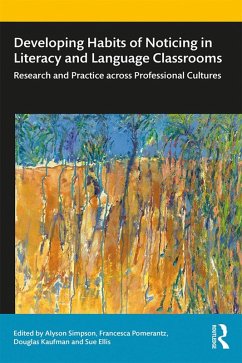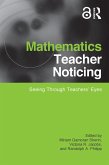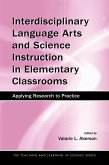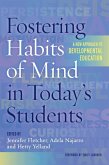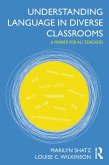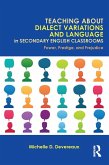Developing Habits of Noticing in Literacy and Language Classrooms (eBook, PDF)
Research and Practice across Professional Cultures
Redaktion: Simpson, Alyson; Ellis, Sue; Kaufman, Douglas; Pomerantz, Francesca
39,95 €
39,95 €
inkl. MwSt.
Sofort per Download lieferbar

20 °P sammeln
39,95 €
Als Download kaufen

39,95 €
inkl. MwSt.
Sofort per Download lieferbar

20 °P sammeln
Jetzt verschenken
Alle Infos zum eBook verschenken
39,95 €
inkl. MwSt.
Sofort per Download lieferbar
Alle Infos zum eBook verschenken

20 °P sammeln
Developing Habits of Noticing in Literacy and Language Classrooms (eBook, PDF)
Research and Practice across Professional Cultures
Redaktion: Simpson, Alyson; Ellis, Sue; Kaufman, Douglas; Pomerantz, Francesca
- Format: PDF
- Merkliste
- Auf die Merkliste
- Bewerten Bewerten
- Teilen
- Produkt teilen
- Produkterinnerung
- Produkterinnerung

Bitte loggen Sie sich zunächst in Ihr Kundenkonto ein oder registrieren Sie sich bei
bücher.de, um das eBook-Abo tolino select nutzen zu können.
Hier können Sie sich einloggen
Hier können Sie sich einloggen
Sie sind bereits eingeloggt. Klicken Sie auf 2. tolino select Abo, um fortzufahren.

Bitte loggen Sie sich zunächst in Ihr Kundenkonto ein oder registrieren Sie sich bei bücher.de, um das eBook-Abo tolino select nutzen zu können.
This book provides models and methods to embed both noticing and the development of teacher agency into teacher education programs and school practice, positioning classroom students as teachers who guide us toward responding to them in the most effective ways.
- Geräte: PC
- ohne Kopierschutz
- eBook Hilfe
- Größe: 1.48MB
Andere Kunden interessierten sich auch für
![Mathematics Teacher Noticing (eBook, PDF) Mathematics Teacher Noticing (eBook, PDF)]() Mathematics Teacher Noticing (eBook, PDF)59,95 €
Mathematics Teacher Noticing (eBook, PDF)59,95 €![Interdisciplinary Language Arts and Science Instruction in Elementary Classrooms (eBook, PDF) Interdisciplinary Language Arts and Science Instruction in Elementary Classrooms (eBook, PDF)]() Interdisciplinary Language Arts and Science Instruction in Elementary Classrooms (eBook, PDF)50,95 €
Interdisciplinary Language Arts and Science Instruction in Elementary Classrooms (eBook, PDF)50,95 €![Fostering Habits of Mind in Today's Students (eBook, PDF) Fostering Habits of Mind in Today's Students (eBook, PDF)]() Fostering Habits of Mind in Today's Students (eBook, PDF)32,95 €
Fostering Habits of Mind in Today's Students (eBook, PDF)32,95 €![Understanding Language in Diverse Classrooms (eBook, PDF) Understanding Language in Diverse Classrooms (eBook, PDF)]() Marilyn ShatzUnderstanding Language in Diverse Classrooms (eBook, PDF)45,95 €
Marilyn ShatzUnderstanding Language in Diverse Classrooms (eBook, PDF)45,95 €![Teaching and Learning Argumentative Writing in High School English Language Arts Classrooms (eBook, PDF) Teaching and Learning Argumentative Writing in High School English Language Arts Classrooms (eBook, PDF)]() George NewellTeaching and Learning Argumentative Writing in High School English Language Arts Classrooms (eBook, PDF)51,95 €
George NewellTeaching and Learning Argumentative Writing in High School English Language Arts Classrooms (eBook, PDF)51,95 €![Teaching About Dialect Variations and Language in Secondary English Classrooms (eBook, PDF) Teaching About Dialect Variations and Language in Secondary English Classrooms (eBook, PDF)]() Michelle D. DevereauxTeaching About Dialect Variations and Language in Secondary English Classrooms (eBook, PDF)55,95 €
Michelle D. DevereauxTeaching About Dialect Variations and Language in Secondary English Classrooms (eBook, PDF)55,95 €![Pursuing Language and Metalinguistics in K-12 Classrooms (eBook, PDF) Pursuing Language and Metalinguistics in K-12 Classrooms (eBook, PDF)]() Renata Love JonesPursuing Language and Metalinguistics in K-12 Classrooms (eBook, PDF)40,95 €
Renata Love JonesPursuing Language and Metalinguistics in K-12 Classrooms (eBook, PDF)40,95 €-
-
-
This book provides models and methods to embed both noticing and the development of teacher agency into teacher education programs and school practice, positioning classroom students as teachers who guide us toward responding to them in the most effective ways.
Dieser Download kann aus rechtlichen Gründen nur mit Rechnungsadresse in A, B, BG, CY, CZ, D, DK, EW, E, FIN, F, GR, HR, H, IRL, I, LT, L, LR, M, NL, PL, P, R, S, SLO, SK ausgeliefert werden.
Produktdetails
- Produktdetails
- Verlag: Taylor & Francis eBooks
- Seitenzahl: 182
- Erscheinungstermin: 15. August 2019
- Englisch
- ISBN-13: 9781000546897
- Artikelnr.: 57493359
- Verlag: Taylor & Francis eBooks
- Seitenzahl: 182
- Erscheinungstermin: 15. August 2019
- Englisch
- ISBN-13: 9781000546897
- Artikelnr.: 57493359
- Herstellerkennzeichnung Die Herstellerinformationen sind derzeit nicht verfügbar.
Alyson Simpson is Professor in the Sydney School of Education and Social Work at the University of Sydney. Her research projects in higher education and primary schools include work on the power of dialogic learning and the impact of digital technology on reading practices and pedagogy. Francesca Pomerantz is Professor in the Department of Childhood Education and Care at Salem State University. Her research and teaching focus on preparing and supporting teachers to teach literacy. As the lead faculty for school and community partnerships, she is responsible for the field component of the university's teacher preparation program. Douglas Kaufman is Associate Professor of Curriculum & Instruction in the Neag School of Education at the University of Connecticut. His current research examines teachers' identities as writers and the development of intercultural understandings in preservice teachers. He also directs the Neag Teaching Abroad Program in Cape Town, South Africa. Sue Ellis is Professor of Education in the School of Education at Strathclyde University. Her research concerns the role and nature of professional knowledge in literacy teaching and how policy and practice frameworks can shape initial and continuing professional development to promote equity through schooling.
List of Figures and Tables
Acknowledgements
Chapter 1. Introduction Sue Ellis (Strathclyde University) and Alyson
Simpson (University of Sydney)
Chapter 2. Teacher Candidates Learn to Notice during Supervisory
Conferences Melanie C. González, Francesca Pomerantz, and Cami Condie
(Salem State University)
Chapter 3. Noticing as Key to Meet the Needs of Developing Writers Judy M.
Parr (University of Auckland)
Chapter 4: Teacher Noticing in Language and Literacy Landscapes of Practice
Sue Ellis, Adele Rowe, Jenny Carey, and Vivienne Smith (Strathclyde
University)
Chapter 5: Challenges and Transformations of Noticing in a New Culture:
Preservice Teachers Teach in South Africa to Learn to Teach in the U.S.
Douglas Kaufman (University of Connecticut)
Chapter 6: TESOL Students' Perspectives: Noticing Classroom Practice
Martha Lengeling, Amanda K. Wilson and Irasema Mora-Pablo (University of
Guanajuato)
Chapter 7: Developing an Implemented Curriculum of Literacy: Contrasting
Approaches to Policy and Practice Rúnar Sigþórsson (University of Akureyri)
Chapter 8: Developing Noticing Capacity to Support Teacher Professionalism
through Dialogic Learning with Literary Texts Alyson Simpson (University of
Sydney)
Chapter 9: Reflections on "Noticing" Research and Implications for the
Future Francesca Pomerantz (Salem State University) and Douglas Kaufman
(University of Connecticut)
List of Contributors
Acknowledgements
Chapter 1. Introduction Sue Ellis (Strathclyde University) and Alyson
Simpson (University of Sydney)
Chapter 2. Teacher Candidates Learn to Notice during Supervisory
Conferences Melanie C. González, Francesca Pomerantz, and Cami Condie
(Salem State University)
Chapter 3. Noticing as Key to Meet the Needs of Developing Writers Judy M.
Parr (University of Auckland)
Chapter 4: Teacher Noticing in Language and Literacy Landscapes of Practice
Sue Ellis, Adele Rowe, Jenny Carey, and Vivienne Smith (Strathclyde
University)
Chapter 5: Challenges and Transformations of Noticing in a New Culture:
Preservice Teachers Teach in South Africa to Learn to Teach in the U.S.
Douglas Kaufman (University of Connecticut)
Chapter 6: TESOL Students' Perspectives: Noticing Classroom Practice
Martha Lengeling, Amanda K. Wilson and Irasema Mora-Pablo (University of
Guanajuato)
Chapter 7: Developing an Implemented Curriculum of Literacy: Contrasting
Approaches to Policy and Practice Rúnar Sigþórsson (University of Akureyri)
Chapter 8: Developing Noticing Capacity to Support Teacher Professionalism
through Dialogic Learning with Literary Texts Alyson Simpson (University of
Sydney)
Chapter 9: Reflections on "Noticing" Research and Implications for the
Future Francesca Pomerantz (Salem State University) and Douglas Kaufman
(University of Connecticut)
List of Contributors
List of Figures and Tables
Acknowledgements
Chapter 1. Introduction Sue Ellis (Strathclyde University) and Alyson
Simpson (University of Sydney)
Chapter 2. Teacher Candidates Learn to Notice during Supervisory
Conferences Melanie C. González, Francesca Pomerantz, and Cami Condie
(Salem State University)
Chapter 3. Noticing as Key to Meet the Needs of Developing Writers Judy M.
Parr (University of Auckland)
Chapter 4: Teacher Noticing in Language and Literacy Landscapes of Practice
Sue Ellis, Adele Rowe, Jenny Carey, and Vivienne Smith (Strathclyde
University)
Chapter 5: Challenges and Transformations of Noticing in a New Culture:
Preservice Teachers Teach in South Africa to Learn to Teach in the U.S.
Douglas Kaufman (University of Connecticut)
Chapter 6: TESOL Students' Perspectives: Noticing Classroom Practice
Martha Lengeling, Amanda K. Wilson and Irasema Mora-Pablo (University of
Guanajuato)
Chapter 7: Developing an Implemented Curriculum of Literacy: Contrasting
Approaches to Policy and Practice Rúnar Sigþórsson (University of Akureyri)
Chapter 8: Developing Noticing Capacity to Support Teacher Professionalism
through Dialogic Learning with Literary Texts Alyson Simpson (University of
Sydney)
Chapter 9: Reflections on "Noticing" Research and Implications for the
Future Francesca Pomerantz (Salem State University) and Douglas Kaufman
(University of Connecticut)
List of Contributors
Acknowledgements
Chapter 1. Introduction Sue Ellis (Strathclyde University) and Alyson
Simpson (University of Sydney)
Chapter 2. Teacher Candidates Learn to Notice during Supervisory
Conferences Melanie C. González, Francesca Pomerantz, and Cami Condie
(Salem State University)
Chapter 3. Noticing as Key to Meet the Needs of Developing Writers Judy M.
Parr (University of Auckland)
Chapter 4: Teacher Noticing in Language and Literacy Landscapes of Practice
Sue Ellis, Adele Rowe, Jenny Carey, and Vivienne Smith (Strathclyde
University)
Chapter 5: Challenges and Transformations of Noticing in a New Culture:
Preservice Teachers Teach in South Africa to Learn to Teach in the U.S.
Douglas Kaufman (University of Connecticut)
Chapter 6: TESOL Students' Perspectives: Noticing Classroom Practice
Martha Lengeling, Amanda K. Wilson and Irasema Mora-Pablo (University of
Guanajuato)
Chapter 7: Developing an Implemented Curriculum of Literacy: Contrasting
Approaches to Policy and Practice Rúnar Sigþórsson (University of Akureyri)
Chapter 8: Developing Noticing Capacity to Support Teacher Professionalism
through Dialogic Learning with Literary Texts Alyson Simpson (University of
Sydney)
Chapter 9: Reflections on "Noticing" Research and Implications for the
Future Francesca Pomerantz (Salem State University) and Douglas Kaufman
(University of Connecticut)
List of Contributors
